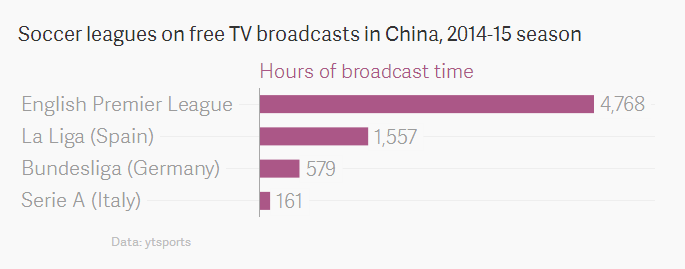This
season, Super Sports Media, which holds the broadcasting rights to the
Premier League in China and Macau from 2010 to 2019, has achieved great
success in revenue streamed from distributing the Premier League rights
to regional free-to-air broadcasters, to Internet streamers including
Tencent, Sina and LeTV and from the significant increase in paying
customers, especially in a market where sports fans are used to watching
games for free, whether it’s the NBA or European football.
This season three streamers—Tencent, Sina, and LeTV each paid about $18 million for the streaming rights to 230 non-exclusive games, compared to about $11 million each paid by PPTV and LeTV each for the rights to all 380 games last season.
Besides, China’s National TV Station, CCTV, agreed to show one league game each every week. That’s a big improvement over recent years. The last time CCTV broadcast Premier League games was in the 2002-03 season.
After so many years cultivating the Chinese market, the efforts of Super Sports Media are now being rewarded. However, Vice President Yu Lingxiao said there is still a long way to go to achieve real success.
Mr. Yu said, from his perspective, the successful sign of a corporation is the formation of a positive and sustainable business model. Although commercial revenues and profits have always been important for a business corporation, the key to the initial success of Super Sports goes beyond revenue from rights distribution.
“Technically, it’s not a success for us. We just estimated the market value of the Premier League in an accurate way. But the value of the league is not decided by us, it’s an outcome of the current supply-demand relationship. ”
So, what can be called a sustainable business model for Super Sports Media in China?
Mr. Yu told Yutang, “Super Sports Media is firstly a media group not a sports group. We position ourselves as a media company. The content comes first, then the platform. This differentiates us from other new media companies.”
The common business model applied by new media companies is firstly to build a platform, then get content and deliver the content to audience. They make profits through advertising sales. But this business model is not reasonable, in Yu Lingxiao’s view. What Super Sports Media tries to create is a complete business circle: content, platform, users, services and brand.
Mr. Yu emphasized that content would always be key for them. They have launched a multi-media platform including over-the-air television, cable television, satellite television, online and mobile, which also differentiates them from others.
China’s sports fans are used to watching games for free, whether it’s the NBA or European football. But, starting this season, many Premier League matches will be available via pay-per-view only. The company sold games to regional free-to-air broadcasters, and to Internet streamers (including Tencent, Sina, PPTV, and LeTV) that usually offered the games for free.
This season three streamers—Tencent, Sina, and LeTV—will show all of their league games for free as well. They each paid about $18 million for the streaming rights to the 230 non-exclusive games. Last season two streamers, PPTV and LeTV, each paid about $11 million for the rights to all 380 games.
In mid-2010 Super Sports Media took over the Premier League’s broadcasting rights from Win TV, which had signed a $60 million three-year contract with the league (2007 to 2009) but failed in China as it insisted on a pay-per-view model that wasn’t yet ready to fly with consumers.
Super Sports Media learned from its predecessor’s mistake. In its first three years of holding the league broadcasting rights (2010 to 2013), viewers were able to watch games through online streamers for free. But having spent over $160 million (link in Chinese) to renew its broadcasting contract from 2013 to 2019, the company has been gradually introducing pay-per-view services too.
Edited by Devlin John

